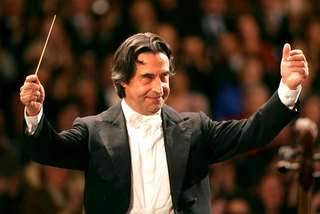|
Back
Magnificent Muti Washington
Kennedy Center Concert Hall
11/21/2009 - & November 19 (New York), 20 (Philadelphia), 24 (New York)
Franz Liszt: Les Préludes, Symphonic Poem no. 3
Sir Edward Elgar: In the South (Alassio), Concert-Overture, op. 50
Sergei Prokofieff: Romeo and Juliet, op. 64 (Selections)
New York Philharmonic, Riccardo Muti (Conductor)

R. Muti (© WPAS)
The Washington Performing Arts Society opened its 2009/2010 Orchestra Series at the Kennedy Center with a superb concert by the New York Philharmonic under the baton of the Neapolitan Maestro Riccardo Muti. WPAS founder Patrick Hayes first presented the NY Philharmonic in Washington sixty years ago in 1949, and the Society still proudly continues the tradition. Maestro Muti made his Washington début with the orchestra in this concert.
The New York Philharmonic, which was founded in 1842, is the oldest symphony orchestra in the United States and one of the oldest in the world. Its distinguished list of world premieres consists of many impressive works such as Dvorák’s New World Symphony, Rachmaninoff’s Piano Concerto no. 3, and Gershwin’s Piano Concerto in F. Among its many American premieres are included the Symphonies nos. 8 and 9 of Beethoven and the Symphony no. 4 of Brahms. Just as impressive is the Philharmonic’s roster of music directors, that has included such luminaries as Gustav Mahler, Willem Mengelberg, Arturo Toscanini, Bruno Walter, Dimitri Mitropoulos, and of course, Leonard Bernstein. Its current music director is the young American Alan Gilbert. The New York Philharmonic was in exceptionally fine form, and Maestro Muti had obviously designed the program to highlight the various choirs of the orchestra. As disparate as the individual works may seem on paper, they all shared a similar composition of orchestration and each one complimented the other quite well.
I had not heard Liszt’s Les Préludes in many years. In fact the last time I encountered the work in concert was with the NY Philharmonic, sometime in the early 1970’s and under the baton of Leonard Bernstein. It has not lost any of its charm and power for me in the ensuing years. Liszt introduced the term “symphonic poem” sometime around 1853. The Symphonic Poem became one of the most popular musical forms of the latter 19th century and was championed by many great composers such as Dvorák, Tchaikovsky, Sibelius, and Richard Strauss. Liszt based his thematic material for Les Préludes on an earlier work (Les Quatre Eléments) and loosely based it on a poem by Alphonse de Lamartine. Maestro Muti gave a fine etching of Liszt’s grand architecture, and with subtle modulations in dynamics he achieved a clear delineation of the inner voices of the woodwinds, especially in the middle section. The string sound was lean and warm, and the very colorful string passages were well articulated. The brass and percussion were imposing in the somewhat bombastic climaxes, which are a thrill to hear. I was especially entranced by the horn solos of Principal Philip Myers. His delicate use of vibrato made his tone quality just delicious.
Elgar’s Concert-Overture In the South was composed in 1904 for a festival of Elgar’s music at Covent Garden. The idea for the composition came to Elgar when he and his wife were vacationing in southern Italy. He came upon the village of Andora where he encountered a shepherd, dressed only in a sheepskin, herding his flock over an ancient Roman bridge. The noisy opening theme is full of Richard Strauss and has no Italian flavor whatever. An heroic sounding construction of chordal sonorities is meant to emulate ancient Roman soldiers and a folksong of the type which a shepherd might sing. Elgar always insisted the melody was of his own devising. A newspaper account of the premiere reported that “the new concert-overture struck at once the note of joy of living in the midst of blue Ionian weather.” Elgar is of course the quintessential Edwardian composer, and his music is so evocative of that era. In only a few coming years Stravinsky would make this style of composition completely obsolete. Muti and the Philharmonic gave a rousing and convincing rendition of the overture, which once again featured many superb solos from the Principals of the orchestra.
Prokofieff’s ballet score for Romeo and Juliet is today so popular that it is hard to imagine the composer had great difficulty in initially producing the ballet in Russia. In fact the dancers of the Bolshoi Ballet proclaimed the music “undanceable.” The delay in having a premiere production of the ballet, which was eventually done in Czechoslovakia, is the reason the composer arranged this suite of extracts for concert performance. To our “modern” ears it sounds eminently melodic, rhythmic, and danceable. Maestro Muti’s artistry was potently revealed in this performance. His sense of drama, and the heart-wrenching poetry he elicited from the players, was extraordinary. His baton technique is precise and clear. The control he exhibits over an orchestra is legendary. He gave ample demonstration of this authority not only in the ballet score, but throughout the entire program. It was a memorable concert full of dazzling virtuosity, and was most certainly a joy to hear. Could one expect anything less from an orchestra of this caliber and a maestro of such exceptional qualities? I look forward to frequent returns in subsequent seasons.
Micaele Sparacino
|